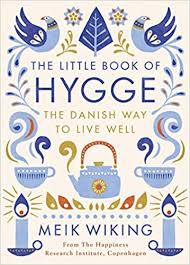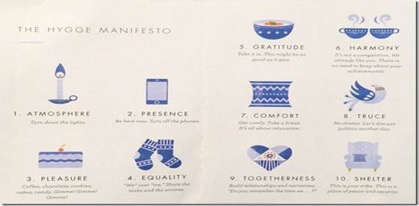The Little Book Of Hygge: The Danish Way To Live Well
Author: Meik Wiking
Genre: Happiness, Self-Help, Positive Psychology

Ah… the elusive but eternal pursuit of happiness! The ‘self-evident’, ‘unalienable right’ of all humanity! So then, mirror, mirror on the wall, who is the happiest of them all?
It turns out that Denmark (and the rest of the Nordic countries) have consistently ranked Top 3 Happiest countries in UN surveys. So what really makes it tick?

It’s many reasons of course. Wealth creation, welfare state, clean government and systems, etc. But beyond the hard factors, one intriguing ‘emotional’ feature is the Danish concept of Hygges (pronounced hyoo-ga). Loosely translated, it means Cosyness or giving yourself the little indulgences. Work hours typically end 3.30-4 pm, leaving evenings free to relax: a wine with a book, a family/friends dinner, music or theatre. A 5 week annual vacation is compulsory. Pregnancy leaves at 9 months plus paternal leave of 3 months (society believes it is critical for parents to spend time with kids).
The author, the CEO of the Happiness Research Centre in Copenhagen, explains the Hygges concept in detail giving multiple examples and suggestions on how we can bring this beautiful thinking in our own lives. “What freedom is to Americans, thoroughness to Germans and the stiff upper lip to the British, hygge is to Danes.”

The attached 10 point Hygge manifesto is remarkable. Starting with creating the perfect atmosphere (candles), to being here and now, to an attitude of gratitude to creating a snuggle area in your house. Meik – based on hard data over so many years – is a strong believer in the strength of social relationships: “the best predictor of whether we are happy or not is our social relationships. It is the clearest and most reoccurring pattern I see when I look at the evidence on why some people are happier than others.”. He adds: “Happier people have a larger quantity and better quality of friendships and family relationships. Thus, good relationships both cause happiness and are caused by it.”
Another piece of advice is to hug someone you love: “A widespread saying is that hugs make us happier, and that is true – oxytocin starts flowing in intimate situations, and helps us connect to each other.”
The Princeton university study is intriguing. Scientists asked 909 women what made them happiest and also how much time they spent on each activity per day. See chart and get amused! Looks like work and bosses make us least happy and yet we spend maximum time at work!

Weik also advices looking at all senses to get Hygge or this feeling of comfort and cosyness in your house:
- Taste – Good food, in itself, can make us happy
- Sound – Fireplace wood cracking, light music (idea is to enjoy silence)
- Smell – Flowers, or even your favourite food or blanket
- Feel – Wooden furniture, fur cushions
- See – Watch nature, falling snow, sea waves, flame of a fire, fishes in a tank etc.
- Sixth Sense – Feeling of safety and trust with the one you are with.
While the book is a welcome change, some of the examples tend to be obvious and often not so unique. I think the core concepts could have been covered in a long article or even article series instead of a whole thick book. Beyond Hygge, the chapter on what makes Danes so happy (social security, work-life balance, etc.) is illuminating.
Why should you read the book: To be happy, why else? After all, supposedly the pursuit of happiness is what defines all that we are chasing (or at any rate should be chasing) in life. Meik gives us multiple suggestions that have actually worked in Denmark.
Goodreads Link: The Little Book of Hygge: The Danish Way to Live Well by Meik Wiking | Goodreads

 This information will never be shared with third party
This information will never be shared with third party
Thank you for this book review. Very interesting facts!
What a review! The review itself is a gentle (or rather strong) reminder that we need to reward ourselves more often. It reminds me of small things that give us instant rewards, which our professions fail to quite often.
Very well explained!👏🏻👏🏻
What an amazing review, a good reflection on self love and the idea of taking care of ourselves by taking out time which is the ultimate reward. Loved this🙌🏻🙌🏻
An amazing review and very well explained